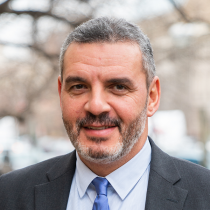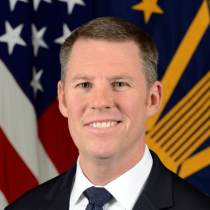As published by the Middle East Institute by Khaled Elgindy, Randa Slim, Mick Mulroy, Nazee Moinian, Chris Kubecka, Gerald M. Feierstein on December 3, 2020
Three issues to watch on Israel/Palestine
Khaled Elgindy
Senior Fellow, Director of Program on Palestine and Palestinian-Israeli Affairs

In its determination to do away with a two-state solution to the Israeli-Palestinian peace settlement and the principles that ungird it, a lame-duck Trump administration could still do considerable damage before leaving office on Jan. 20. Below are three issues to watch in the next seven weeks, in order of highest to lowest probability.
- Advancing “doomsday” settlements: Having already received blanket approval from the Trump administration for any and all Israeli settlements in the occupied territories, embattled Israeli Prime Minister Benjamin Netanyahu, who has been dogged by ongoing protests, a looming corruption trial scheduled for early 2021, and the possibility of early elections, is poised to advance plans for two highly explosive settlement projects in the Jerusalem area, Givat HaMatos, located between Bethlehem and East Jerusalem, and the area known as “E1” located east of the city. The two settlements, often referred to as “doomsday” settlements, for their lethal effect on the prospect of a viable, contiguous Palestinian state, would sever Palestinian neighborhoods in the southern and eastern sectors of the city from the rest of East Jerusalem as well as from adjacent Palestinian areas in the West Bank. According to Jerusalem expert Danny Siedemann, the goal is “to create not only irreversible facts on the ground, but a ‘new normal’ that would enshrine a Greater Israel and an exclusively Israeli Jerusalem.” The move also appears aimed at tying the hands of the incoming Biden administration, which would be loath to enter into a public confrontation with Israel.
- Redefining Palestinian refugees: Another issue on the wish list of Israel’s hardline government relates to changing the status of Palestinian refugees. Having successfully lobbied the administration to defund the United Nations Relief and Works Agency (UNRWA), which provides health, education, and other services to Palestinian refugees, supporters of Israel’s hardline government are calling on the administration officially to redefine Palestinian refugee status to apply only to those personally displaced during Israel’s creation in 1948-49 while excluding their children and grandchildren. The hope is that by effectively defining Palestinian refugees out of existence this would permanently take the issue off the table. Although the United States does not have the authority to unilaterally change UNRWA’s mandate or alter internationally accepted definitions of who does or does not qualify as a refugee, such a move would be one more attempt by the Trump administration to do away with international legal norms as a basis for resolving core issues of the Israeli-Palestinian conflict, which so far include major policy reversals on Jerusalem, Israeli settlements, and status of occupied territory.
- Additional normalizations: Building on recent agreements involving the UAE, Bahrain, and Sudan, the administration could push through additional normalization agreements with Israel before Trump leaves office. Pushing Arab and Muslim-majority countries to normalize with Israel has been a central pillar of the Trump administration’s regional strategy, in part because it serves to consolidate the status quo and further marginalize the Palestinian issue. Although another major normalization announcement during Trump’s remaining time in office seems unlikely, such a development remains within the realm of possibility. Among those currently being discussed as likely candidates are Pakistan, Morocco, and Saudi Arabia, with the latter being the least likely.
Rumors swirl in Lebanon over the prospects for more sanctions
Randa Slim
Senior Fellow, Director of Conflict Resolution and Track II Dialogues program

Last November, the U.S. Treasury’s Office of Foreign Assets Control (OFAC) sanctioned Mr. Gebran Bassil, the Lebanese president’s son-in-law and political heir apparent, citing his role in corruption in Lebanon. Rumors are swirling in Lebanon that more such sanctions are forthcoming in the waning days of the Trump administration. If these rumors turn out to be true, this move will be in line with the administration’s modus operandi in Lebanon. A recent Wall Street Journal article discussed potential sanctions on Lebanon’s Central Bank and its governor, Riad Salameh, for his role in impeding a forensic audit of the bank’s operations, which U.S. officials believe may uncover evidence of corruption and money laundering linked to Hezbollah financing. Despite the speculation, this scenario seems highly unlikely given the devastation such sanctions would wreak on an already imploding economy.
To-date, U.S. sanctions have mostly targeted Hezbollah officials, individuals and entities linked to them, as well as their allies among Lebanese politicians. In that respect, these sanctions were spun in Lebanon by Hezbollah and their allies as part and parcel of the Trump administration’s “maximum pressure” strategy against Iran. Mr. Bassil’s designation pursuant to the Global Magnitsky Human Rights Accountability Act introduced a much-needed dimension to the use of targeted sanctions as part of U.S. policy in Lebanon. It addressed a long-standing Lebanese demand of the international community to hold their corrupt officials accountable. There is speculation that the next round of sanctions, if introduced, will likely target Lebanese politicians who, though opposed to Hezbollah, have long been involved in corruption schemes and are part of the ruling oligarchy that has used its political and economic power to enrich itself.
There is still ongoing debate inside the incoming U.S. administration’s foreign policy team about the sanctions imposed by the Trump administration, and what leverage they can give them or not going forward as they seek to reshape U.S. foreign policy, especially in dealing with countries like Iran. Nevertheless, we should not expect the Biden administration to adopt a different approach to Trump’s concerning the use of targeted sanctions in fighting corruption in countries like Lebanon. Fighting corruption has been a long-standing interest of President-elect Joe Biden and will figure highly in the value shift U.S. foreign policy will undertake in the next few years. While neither the Middle East in general nor Lebanon in particular are priorities for the next U.S. administration, sanctions will remain one tool the new U.S. administration will rely on in its Lebanon policy.
Troop withdrawals shouldn’t come at the expense of everything we’ve fought for
Mick Mulroy
Senior Fellow for National Security and Defense Policy

Afghanistan
By my estimation (and those I know who are serving there now) 2,500 troops are not enough to maintain our control of key areas in Afghanistan such as Kandahar, Jalalabad, and Khowst. That number of troops is barely enough to maintain security in the Kabul area.
With the addition of 2,000 more troops to bring the number to 4,500, we would be able to help maintain the Afghan government’s control of these areas, have our own significant counter-terrorism capability, protect the current government, and prevent it from falling to extremists again. The Afghan National Army and National Directorate of Security are carrying out the bulk of the fighting with our support.
Although we all want to see our forces come home from conflict areas, it should not be at the expense of everything we have fought for over the last 20 years. We do not want to have the next generation have to fight their way back to where we are today. Our political leaders should set our national security objectives and our military commanders with intelligence support should be the ones that determine what forces are needed to meet those objectives.
Somalia
The external terrorism threat coming from Somalia has been reduced as a result of the efforts of the U.S. military, the CIA, and our very capable Somali partners. But left unchecked we could see what happened at the Westgate Mall in Kenya in 2015, when 67 civilians were killed by al-Shabaab, happening in the United States.
We can always adjust the level of forces based on the current threat as assessed by our intelligence services, but withdrawing all of our forces is a mistake. In the future we may have to fight our way back in, just to get to the place we are right now.
Mick Mulroy, former DASD for the Middle East, retired CIA and US Marine, MEI senior fellow
Keeping up the pressure on Iran
Nazee Moinian
Non-resident Scholar

One can almost envision President Donald Trump’s meetings on Iran where his advisers are trying to rein in his most reactive, transactional instincts by dissuading him from bombing key nuclear sites, with the president snapping back about this being his last chance to leave a permanent mark on the Islamic regime. In all likelihood, the “maximum pressure” campaign against Iran was born out of a compromise between the president and his national security team and will be continued until his departure.
Reinterpreting the word “maximum” to mean more creative and possibly irreversible sanctions, intensifying the diplomatic activity already under way between the Gulf states and Washington, and tacitly approving the assassination of key Iranian figures (with perhaps more to follow), may be the only viable options available to the outgoing president.
Tom Schelling, the Cold War thinker and deterrence strategist, has famously said, “The threat of war, is war.” Trump does not need to attack Iran to put the regime on notice. The Iranian authorities already feel the pressure, and barring any diplomatic or military mishaps, will have no choice but to renegotiate a more stringent nuclear deal that should include Iran’s missile program, regional activities, and even human rights abuses.
President-elect Joe Biden may be just the man for the moment. He has decades of foreign policy experience and a highly capable team surrounding him. Furthermore, he inherits considerable leverage over Iran, which faces a teetering economy, a surging number of COVID-19 cases, and the killing of two top military leaders this year alone. Historically, Tehran has responded to pressure. After the U.S. invaded Iraq and Afghanistan in the early 2000s, Iran halted the military dimensions of its nuclear program. When President Barack Obama rallied the international community around comprehensive sanctions a decade later, Iran accepted meaningful limits on its nuclear program. This time may be no different.
Will the administration act to curb Iran’s use of technology?
Chris Kubecka
Distinguished Non-resident Fellow

The Trump administration has been a strong proponent of cyber and “defend forward” in its foreign policy, as well as keeping and strengthening sanctions against the Iranian government. Iran is a quick learner when it comes to technology and how to leverage it in joint operations with North Korea and China. Current U.S. sanctions on Iran are explicit when the technology involves nuclear and more directly attributable technology that can cause physical and destabilization harm in the Middle East. The current sanctions cover common technology in a broader, more generalized sense but not a refined manner. The Iranians currently and regularly skirt broad technology sanctions, using products from U.S. and European technology companies. These generally sanctioned products are in widespread use and easily viewed on the internet per my recent computer system based open source intelligence scans carried out on Nov. 21, 2020.
The Iranians are eagerly hopeful the Biden administration will turn back at least some of the sanctions currently in place, jump-starting their economy, steadying their currency, and allowing some aspects of normalcy to return. The Trump administration, however, is eager to halt the Iranian economy due to fears of further weaponization of nuclear materials and believes in defend forward, a policy that proactively uses cyber to restrict enemy usage of American technology. Could Donald Trump, prior to his departure from office, sign executive orders to actively take down broadly sanctioned digital technology and explicitly strengthen general technology usage sanctions while authorizing defend forward to deny Iran the capability to use discovered technology?
Potential designation of Yemen’s Houthis will undercut diplomacy and undermine US counter-terrorism efforts
Gerald Feierstein
Senior Vice President

It remains unclear whether the outgoing Trump administration will move forward with a plan to designate Yemen’s Houthi movement as a foreign terrorist organization (FTO) before leaving office in January. There was broad speculation that the State Department would make the announcement before Secretary Mike Pompeo’s travel to Israel, Saudi Arabia, and the United Arab Emirates in November. The designation was presented as a means to pressure Iran further, although the impact of such a decision on Iran is murky at best.
While the Houthis certainly bear the bulk of the responsibility for the ongoing civil conflict in Yemen and are justifiably accused of substantial human rights violations and atrocities in the conflict, it’s unclear whether their actions justify an FTO designation. Indeed, the absence of an announcement thus far may reflect the broad pushback that the earlier administration statements had generated. In fact, a Houthi designation would undercut U.S. and international interests in several ways:
- Humanitarian organizations have expressed concern that the designation would complicate further their ability to deliver essential assistance to the 70 percent of Yemenis in desperate need but living in areas under Houthi control;
- As a political resolution of the conflict will almost certainly include providing the Houthis with a greater voice in Yemen’s political affairs, a designation would limit the ability of the U.N. special envoy to broker an agreement and end the conflict;
- The designation would constrain the ability of the incoming Biden administration not only to play an active role in support of the U.N. special envoy but also to engage any Yemeni government formed on the basis of a U.N. agreement that included Houthi participation; and
- The use of FTO designations for overtly political objectives as opposed to legitimate counter-terrorism purposes would undermine the credibility of U.S. designations and make it more difficult in the future to generate essential international cooperation with U.S. counter-terrorism initiatives.
Photo by BRENDAN SMIALOWSKI/AFP via Getty Images


